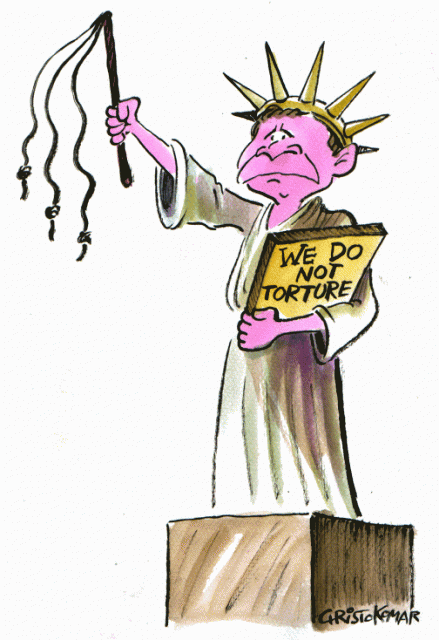Search
Democracy Links
Member's Off-site Blogs
own goal .....

from Crikey …..
Torture for Dummies: a US Justice Dept primer
Jeff Sparrow writes:
Most of the descriptions of how the Bush gang conducts itself in its various gulags have been produced according to the principles George Orwell long ago identified, in which "a mass of Latin words falls upon the facts like soft snow, blurring the outline and covering up all the details."
The release of a legal memorandum sent by the Justice Department to the Pentagon in 2003 melts that snow a little more.
In essence, the memo reveals Deputy Assistant Attorney General John Yoo explaining that military interrogators could bypass laws against assault, maiming and other crimes on the basis that the president's ultimate authority as commander in chief overrode such petty considerations.Yoo wrote:
If a government defendant were to harm an enemy combatant during an interrogation in a manner that might arguably violate a criminal prohibition, he would be doing so in order to prevent further attacks on the United States by the al Qaeda terrorist network. In that case, we believe that he could argue that the executive branch's constitutional authority to protect the nation from attack justified his actions.
In other words, it’s not torture if you’ve got a reason. Which is handy because, as Ariel Dorfman pointed out a few years ago: "Every regime that tortures does so in the name of salvation, some superior goal, some promise of paradise."
Yoo generated his remarkable document as the United States took into custody thousands of prisoners from the occupation of Afghanistan, and just as it prepared to attack Iraq. In that sense, as Martin Lederman, a former lawyer with the Office of Legal Counsel who now teaches law at Georgetown University, explained to the Washington Post, the Yoo memo led directly to Abu Ghraib:
What else could have been the source of belief in Iraq that the gloves were off and all laws could be disregarded with impunity? It created a world in which everyone on the ground believed the laws did not apply. It was a law-free zone.
After the photos that shocked the world, Lyndie England and a small number of other unfortunates who got their heads on film went to jail. Yet it’s increasingly clear that the responsibility for their conduct extends to the very top of the American political system.
In a new article, Vanity Fair draws attention to an earlier torture document, an action memo sent by the general counsel of the U.S. Department of Defense to Donald Rumsfeld. The memo recommended that Rumsfeld gave "blanket approval" to fifteen techniques of aggressive interrogation. Not only did Rumsfeld – whom Richard Nixon had once presciently described as a "ruthless little bastard" – sign, he added a few suggestions of his own.
"I stand for 8–10 hours a day," he wrote. "Why is standing limited to 4 hours?"
Why indeed? The Vanity Fair piece quotes from the interrogation log kept regarding a certain Detainee 063, upon whom Rumsfeld’s techniques were applied: sleep deprivation, stress positions, extreme temperatures, s-xual humiliation and the rest of the vicious little list.
The results can be summarised as follows:
Detainee began to cry. Visibly shaken. Very emotional. Detainee cried. Disturbed. Detainee began to cry. Detainee bit the IV tube completely in two. Started moaning. Uncomfortable. Moaning. Began crying hard spontaneously. Crying and praying. Very agitated. Yelled. Agitated and violent. Detainee spat. Detainee proclaimed his innocence. Whining. Dizzy. Forgetting things. Angry. Upset. Yelled for Allah.
Urinated on himself. Began to cry. Asked God for forgiveness. Cried. Cried. Became violent. Began to cry. Broke down and cried. Began to pray and openly cried. Cried out to Allah several times. Trembled uncontrollably.
As Flannery O’Connor once remarked, "Truth does not change according to our ability to stomach it." So here we have the United States of America, the nation that Kevin Rudd just described as "an overwhelming force for good", consciously and deliberately torturing people in its custody.
The new Yoo document is particularly interesting because it highlights the premeditation of the process. Murdoch’s flying monkey brigade generally defends what it likes to call "robust interrogations" with elaborate descriptions of ticking time bombs and the rest of it.
But, as Scott Horton argues:
These memoranda have been crafted not as an after-the-fact defense to criminal charges, but rather as a roadmap to committing crimes and getting away with it. They are the sort of handiwork we associate with the consigliere, or mob lawyer. But these consiglieri are government attorneys who have sworn an oath, which they are violating, to uphold the law.
The only silver lining to this vile cloud is that, as Salon’s Glenn Greewald points out, Bush’s torture lawyers might have been too clever for their own good. The administration has itself insisted that bin Laden’s alleged driver could be prosecuted as a "war criminal" on the basis that you become guilty of war crimes not only if you violate the laws of war yourself but also if you take part in a conspiracy to do so.
How else would you describe John Yoo’s extraordinary memorandum except as a conspiracy to commit war crimes?Jeff Sparrow is the editor of Overland.
- By John Richardson at 3 Apr 2008 - 10:20pm
- John Richardson's blog
- Login or register to post comments
Recent comments
7 min 10 sec ago
25 min 34 sec ago
54 min 14 sec ago
1 day 2 hours ago
1 day 3 hours ago
1 day 4 hours ago
1 day 4 hours ago
1 day 4 hours ago
1 day 20 hours ago
1 day 21 hours ago